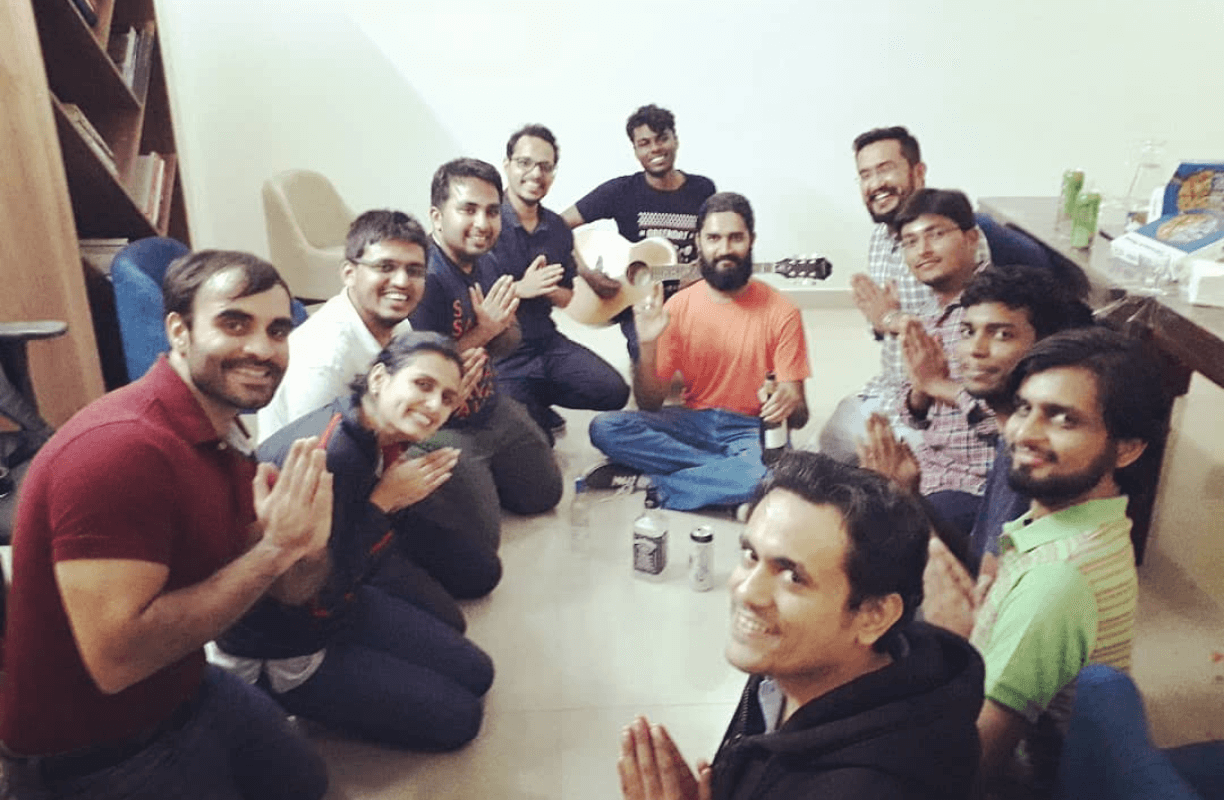You are now leaving the Bright website and entering a third-party website. Bright has no control over the content, products, or services offered, nor the security or privacy of information transmitted to others via their website. We recommend that you review the privacy policy of the site you are entering. Bright does not guarantee or endorse the products, information, or recommendations provided on any third-party website.
Surprising sisters:
A non-deterministic system, characterised by:
Data-driven decisions
Rapid feedback
Inexplicable, and surprisingly useful, intuition*
Not a bad description of the practice of Data science. But…. I had poker in mind.
Given the similarities, Poker is an accelerator of life learnings for a Data scientist.
Provocative patterns
I first played at age 21, among a group of two dozen dilettantes. It tended to a tournament format - multiple tables, one king of the hill.
I had early good fortune – and perhaps a smidgen of starter talent - and won 2 set-ups within the month.
A dollop of success fires your engagement. You pursue deliberately, hunting for more of those addictive victory endorphins.
I have yet to venture beyond a game among friends or colleagues, though I thoroughly enjoy game play. What excites me most is the learnings you pick up - here are the 7 that I spot:
In a world of uncertainty, information is your source of survival.
Poker is making decisions in a world of uncertainty. As a result, some wrongly interpret it as a game of luck. However, to become an effective player, you must NOT blindly accept your fate to the turn of the cards.
You find ways to efficiently reduce uncertainty, and then make good risk-considered decisions, evaluating probabilities correctly. Probabilities refer both to the more transparent probabilities of the turn of the cards, as well as the rather opaque probabilities of how people will behave.
By basic training, data scientists come equipped with a toolkit of probability – poker is a practice ground. But much more importantly, the way a poker player reduces uncertainty is finding ways to extract information.
Sometimes it comes cheaply, by looking for the tell (behavior-based signals) or the implications of a player’s strategy (game-theory forecasting). Sometimes it comes at a cost, by playing a bet to gauge an opponent’s reaction, thereby gaining their leaky information.
Tough data science problems require you to extract as much data from the system in question. Data does not always come clean. It does not always come in big datasets. Every data point, every small data, every example or story is a clue towards what is really going on.
People are the process. Play the people to beat the process.
“Poker is not playing the cards. It is playing the people. The cards are simply your instrument of drama.”
This quote has stuck with me. It was said by a former McKinsey colleague who had spent time as a pro in Vegas. He said this as he observed my brazen game play in a head-to-head.
In Poker, your best source of information to combat uncertainty (i.e., what cards the others are holding) are the people holding those cards. It is their decisions, their strategies, their behaviors, their tells.
In business, people - often enough - are still the ultimate decision makers. Thus, in a data-science-infused-business-process, there will still be people punctuating the process.
The toughest data science prediction challenges are tough because of those chaotic complex machines we call human minds. Appreciating human behavior - how it motivates, how it orchestrates, how it reveals - is a vital tool for any data scientist wanting to pursue the big problems enmeshed by people.
Strategy is a long game. Seek net-positive strategy.
You don’t win a Poker game from a single hand. Your strategy can fail in the short-term but win in the long-term. Your strategy can lose you games but be net-positive in the long-term.
Game theory is finding ways to predict where a system (involving distinct “optimizing” players) is heading, based on the strategies of these players. Game theory in practice is taking advantage of these predictions to influence the journey of the system and land it to your advantage.
Poker – with several stages, profit-seeking players, precise probabilities of the cards – is a territory rife in game theory exercises. But why does a data scientist need an appreciation of game theory?
In systems involving people, often enough, you do not need a big-data-trained model to know where the system is heading. Knowing where sound logic and sensible assumptions can get you good answers, and where it is better to invest data collection towards machine learning and model prediction, is a vital skill when working with complex systems, with multiple components to fit together.
Drop self-pity. Make do with what you have to get your outcome.
I so rarely hear an effective player say they have lost because “I had a bad run of the cards” or “I didn’t have anything to play with.” As my former colleague had said, “Cards are the instrument of drama. They are not the play.”
Even if you can’t control what you have in hand, Poker teaches you this does not have to singly determine whether you will win. It is how you use your hand, how you learn and how you represent yourself to achieve your best outcome.
If you are going to win in the long-run, you need to learn how to find value gains from the dreadful drops as well as how to maximize gains from tempting turns.
Data Science skills are a complex mosaic
See our article: 18 skills of a Full Workflow Data Scientist.
You are stronger in some skills, less so in others. Moreover, sometimes you have a great dataset, sometimes it is muddied by a tornado of mismanagement.
You prosper not by self-pity, but in how you use your data to get purchase on your problem. I often hear “I don’t trust this data because it is inaccurate.” But inaccuracy is the wrong focus.
The better question is whether the variables even have some semblance of information – despite inaccuracies, or noise – that support your ability to test and explain a causal process. Or that give you that slight information gain towards prediction.
Even noisy data can expose a story. We see this time and again in Data Science.
Balance the cognitive and the instinctive in your decisions.
We cannot always rely on cognitive decision-making – what Kahneman calls System-2. Most often, we need to work with instinctive decision-making – the System-1.
Poker is fast-paced decision-making. If you progress by relying exclusively on the cognitive System-1 processes, you exhaust yourself or worse, making incomplete computations that take you astray. You would have probably done better with decisions taken from trained instincts.
Admittedly, instinctive decision-making still must be well-trained. More game play makes you a better player by training those instincts. Repeated cognitive deliberate decisions – the game-theoretic thinking mentioned above - pave the way for better instinctive decisions.
As an aside, one neuroscience theory is that the deliberate conscious decisions are what drive the build-up of myelin sheaths on the axons of our brain’s neurons. Over time this is what gives us faster, better instinct.
Poker offers good training for recognising that decisions are a healthy mix of the instinctive and the cognitive. The key is finding the balance for the problem at hand given your experience, and scarcity of time.
Representation can become reality – prepare your defences.
No one has absolute certainty about your hand until the cards are turned. What information you show – or leak – is what drives their perception. Ah, that infamous bluff!
Representation is power for the bold player - a nemesis for her opponent.
You could say representation is like data manipulation – which is absolutely not the role of a data scientist.
The relevant lesson is when you are the player receiving the bluff: sometimes the story you read from the data points you see can be completely wrong.
You are using bad data which you have over-read. Or, you have misread a story in the data, which is not reality. As a data scientist looking for causal processes, you must develop hypotheses, you must seek stories.
But you must be the constant skeptic looking for something that upends your expectations. Something that surprises your settled story. You are on constant lookout for the data that is the bluff.
Embrace risk towards your big wins.
My single biggest lesson from Poker is the importance of embracing risk in decision-making. I grew up in a conservative family of career doctors. Risky decisions were sin. So, it took a long while to internalise the following...
You cannot access big gains or big wins, by not being ready to take on risk.
This is not to say you must become the compulsive gambler ‘in it for the thrill’ and losing all sensible judgement.
Rather, you need to practice how to make rational decisions, despite being immersed in risky outcomes with potential upsides and downsides. A 90% probability win is still potentially a risk, but it can be a risk that should be taken. A 10% probability win can also equally be a good call, depending on context and potential upside.
This learning is most relevant for data science project planning. I often refer to ‘Value, Volume, and Venture use cases.” [See my article The CEO’s guide to developing a Chief Data Scientist.”) By Venture use cases, I mean moonshot opportunities.
As a data science team, you have to find them and invest sensibly – constantly evaluating progress. It is where you might get surprising impact and where you will likely find your innovation.
Is seven sufficient?
If you don’t already play Poker, and this post has inspired you, then it will rest content in its purpose. If you do play and feel I have short-changed a relevant lesson, feel free to suggest, or better, write up a paragraph.
Happy flops, because every flop offers opportunity.
* In the event that you are screaming “There’s no intuition in Data science!”, I beg to differ. Refer to my keynote at the Fifth Elephant 2018: The Power of Intuition in Data Science



